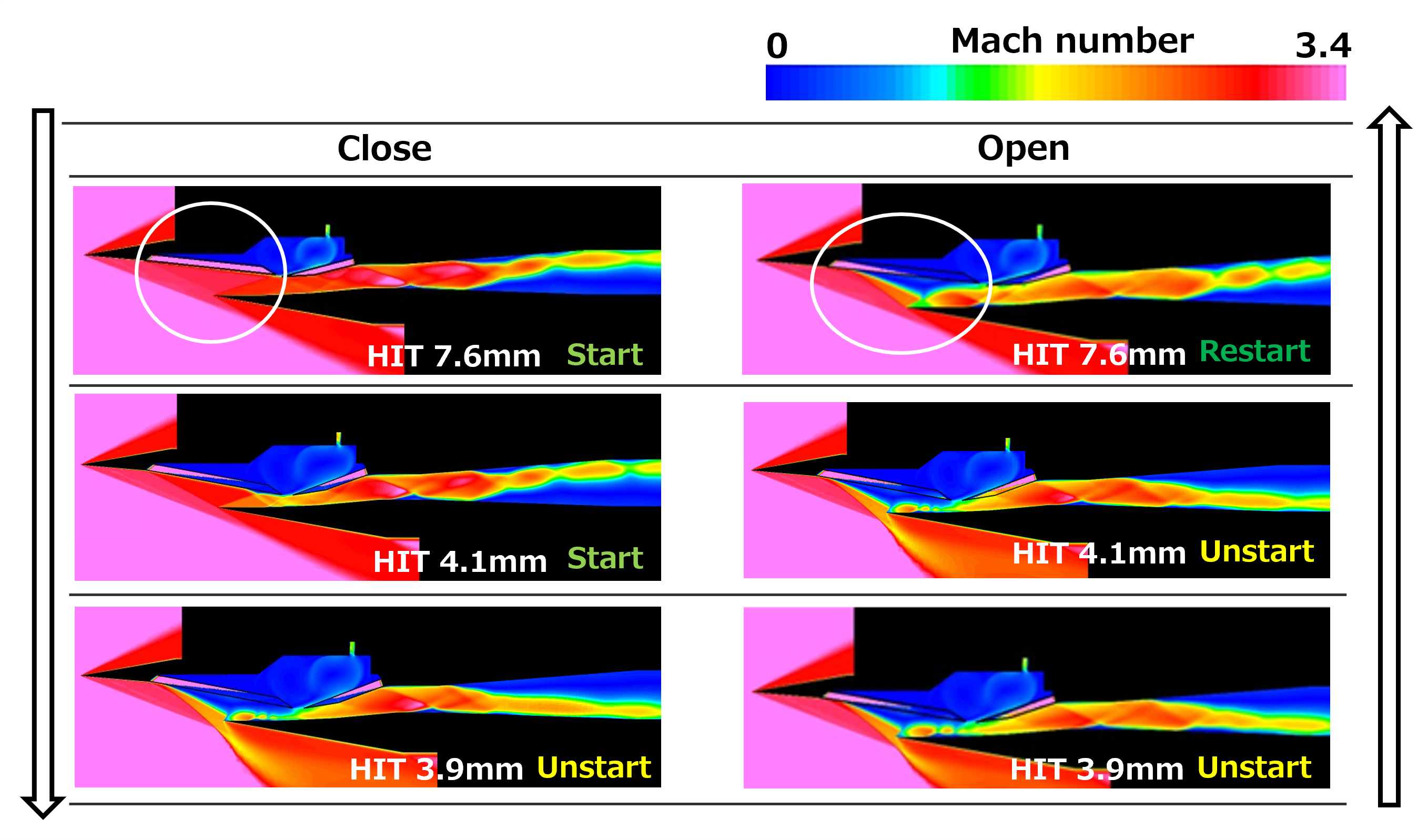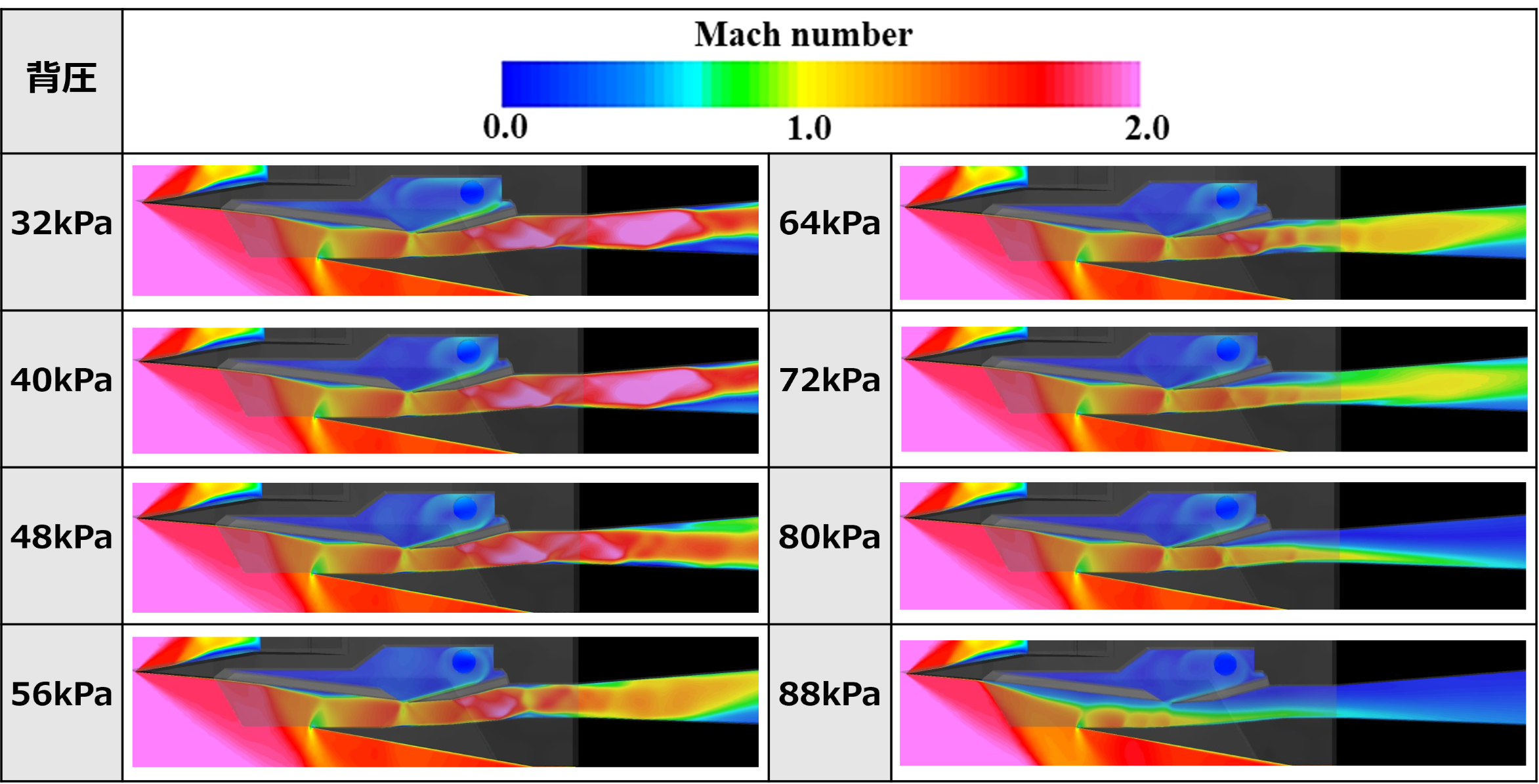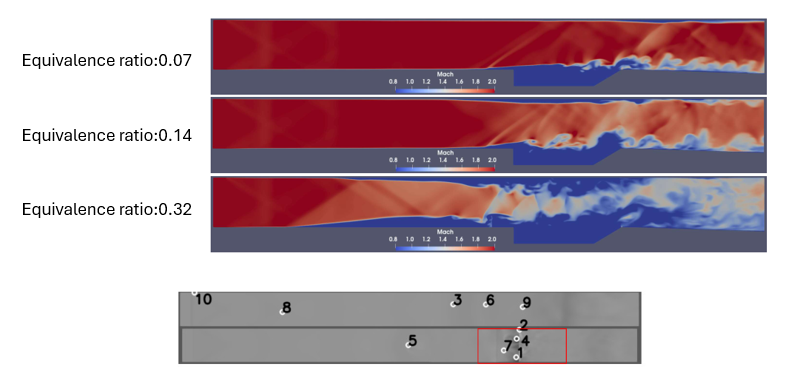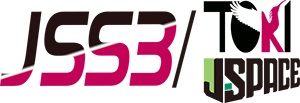Hydrogen Application to Aircraft and Future Space Transportation System
JAXA Supercomputer System Annual Report February 2024-January 2025
Report Number: R24EA2121
Subject Category: Aeronautical Technology
- Responsible Representative: Sadatake Tomioka, Leader, Hydrogen Aerospace Plane Team
- Contact Information: Hideyuki Taguchi(taguchi.hideyuki@jaxa.jp)
- Members: Shima Ariyoshi, Yu Endo, Manami Fujii, Kaito Hirose, Motoyuki Hongoh, Hiroki Itou, Taku Inoue, Aoto Kikui, Ryota Kobayashi, Shota Kiuchi, Masafumi Momose, Toshihiko Munakata, Tomofumi Narita, Koutarou Nakayama, Shinji Nakaya, Koichi Omi, Junichi Oki, Ayuto Suzuki, Shunsuke Imamura, Shunsuke Takamatsu, Hideyuki Taguchi, Satoi Yamaguchi, Ryo Yoshida
Abstract
This research aims at the demonstration of the thrust control method of a hypersonic pre-cooled turbojet engine using liquid hydrogen fuel and the aircraft / propulsion integrated control method. We acquire the control characteristics of the hypersonic integrated control experimental aircraft to establish the aircraft / propulsion integrated control method taking into account the mutual interference of hypersonic airframe and hypersonic engines. In addition to defining the required specifications of hypersonic aircraft, we present the design specifications of the hypersonic experimental aircraft for carrying out flight demonstration of hypersonic pre-cooled turbojet engine.
Reference URL
Please refer to 'Research on technology for applying hydrogen fuel to aircraft and future space transportation systems|JAXA|Research and Development Directorate'.
Reasons and benefits of using JAXA Supercomputer System
We need a long calcularion time to obtain the aerodynamic characteristics of the overall hypersonic experimental aircraft by CFD analyses.
For reacting flow simulation including NOx, there are many chemical species and calculation cost is high.
Achievements of the Year
The CFD analysis of the High-Mach Integrated Control Experimental Aircraft with the model support sting was conducted to evaluate the infuluence of the sting on the aerodynamic characteristics. (Fig.1)
To evaluate the hysteresis during ramp height actuation of the HIMICO intake, a motion analysis using overset grids was conducted. (Fig. 2)
We conducted a numerical analysis targeting combustion tests of a scramjet engine model combustor and performed sparse optimization of sensor placement to understand the internal state of the combustor based on the pressure distribution on the upper and lower walls obtained from the analysis.(Fig. 3)
CFD analysis was conducted to investigate the behavior of pseudo-shock waves in response to back pressure changes in the ramjet engine for High-Mach Integrated Control Experiment (HIMICO). (Fig. 4)

Fig.1: Flow field around the wind tunnel model of High-Mach Integrated Control Experimental Aircraft (Mach number distribution, Angle of attack: -15deg)

Fig.2: Variations of internal flow of Hypersonic Intake by thechange of ramp angle (Mach number distribution)

Fig.3: Variations of internal flow of hypersonic Intake by the change of back pressure (Mach number distribution)

Fig.4: Internal flow of Supersonic Combustor (Mach number distribution, Results of sparse optimization)
Publications
- Peer-reviewed papers
Yuki Kuwabara, Manami Fujii, Yuki Fujimori, Yusuke Hoshiya, Rintaro Tanaka, Shima Ariyoshi, Ayuto Suzuki, Tetsuya Sato, Hidemi Takahashi, Hideyuki Taguchi, Experimental and Numerical Investigation of the Sideslip Angle on the Ramjet Intake for High Mach Integrated Control Experiment (HIMICO) Model at Mach 2, 34th International Symposium on Space Technology and Science (ISTS), 2023.
- Oral Presentations
Shota Kiuchi , Tomonari Hirotani, Takahashi Hidemi, Hideyuki Taguchi , Asei Tezuka ,"Influence of the Model Support Sting on Mach 5 Wind Tunnel Test of High-Mach Integrated Control Experiment (HIMICO) Vehicle" , 62th Aircraft Symposium , 2024
Shunsuke Takamatsu, Manami Fujii, Shima Ariyoshi, Ryota Kobayashi, Tetsuya Sato, Hideyuki Taguchi, Masahiro Takahashi and Sadatake Tomioka "Numerical Design Study of Intake Flowpath Shape for Hypersonic Combined Cycle Engine" Space Sciences and Technology Conference, 2024.
Shima ARIYOSHI, Manami Fujii, Shunsuke Takamatsu, Ryota Kobayashi, Tetsuya Sato, Tomonari Hirotani, Hideyuki Taguchi and Sadaharu Tomioka "Hysteresis Characterization of Internal Flow in the Intake of a Hypersonic Combined Cycle
Engine Using Moving Overset Grid Method" Space Transportation Symposium FY2025.
Shunsuke Takamatsu, Manami Fuji, Shima Ariyoshi, Ryota Kobayashi and Tetsuya Sato, Tomonari Hirotani, Hideyuki Taguchi, Masahiro Takahashi and Sadatake Tomioka "The Numerical Analysis for Intake Flow Path Design Applied to Turbo-ram / Scram Combined Cycle Engine" 2025.
Ryota KOBAYASHI and Tetsuya SATO "Theoretical Performance Analysis of the Intake Flow Path for a Turboramjet/Scramjet Combined Cycle Engine at Non-Cruise Mach Numbers" Kanto Student Association 64th Graduation Research Presentation, 2025.
Kotaro Nakayama, Shinji Nakatani, Mitsuhiro Tsue,
"Study on Sparse Sensing for Scramjet Engine Combustion Control," Space Sciences and Technology Conference, 2024.
Kotaro Nakayama, Han Hirose, Shinji Nakatani, Mitsuhiro Tsue, Sadatoshi Tomioka,
"Study on Mode Identification for Scramjet Engine Combustion Control," 2025.
Ayuto Suzuki, Manami Fujii, Shima Ariyoshi, Tomofumi Narita, Shunsuke Takamatsu, Tetsuya Sato, Hideyuki Taguchi, Hidemi Takahashi, Tomonari Hirotani, Takayuki Kojima, Visualization and Modeling of Internal Flow a Ramjet Engine for High-Mach Integrated Control Experiment (HIMICO), 16th International Space Conference of Pacific-basin Societies (ISCOPS), 2024.
Usage of JSS
Computational Information
- Process Parallelization Methods: MPI
- Thread Parallelization Methods: OpenMP
- Number of Processes: 1 - 2
- Elapsed Time per Case: 30 Hour(s)
JSS3 Resources Used
Fraction of Usage in Total Resources*1(%): 2.57
Details
Please refer to System Configuration of JSS3 for the system configuration and major specifications of JSS3.
| System Name | CPU Resources Used(Core x Hours) | Fraction of Usage*2(%) |
|---|---|---|
| TOKI-SORA | 61870260.83 | 2.83 |
| TOKI-ST | 1428173.41 | 1.47 |
| TOKI-GP | 0.00 | 0.00 |
| TOKI-XM | 0.00 | 0.00 |
| TOKI-LM | 88709.99 | 6.40 |
| TOKI-TST | 0.00 | 0.00 |
| TOKI-TGP | 0.00 | 0.00 |
| TOKI-TLM | 0.00 | 0.00 |
| File System Name | Storage Assigned(GiB) | Fraction of Usage*2(%) |
|---|---|---|
| /home | 1429.11 | 0.96 |
| /data and /data2 | 400802.00 | 1.92 |
| /ssd | 5420.00 | 0.29 |
| Archiver Name | Storage Used(TiB) | Fraction of Usage*2(%) |
|---|---|---|
| J-SPACE | 8.89 | 0.03 |
*1: Fraction of Usage in Total Resources: Weighted average of three resource types (Computing, File System, and Archiver).
*2: Fraction of Usage:Percentage of usage relative to each resource used in one year.
ISV Software Licenses Used
| ISV Software Licenses Used(Hours) | Fraction of Usage*2(%) | |
|---|---|---|
| ISV Software Licenses(Total) | 13088.05 | 8.94 |
*2: Fraction of Usage:Percentage of usage relative to each resource used in one year.
JAXA Supercomputer System Annual Report February 2024-January 2025


